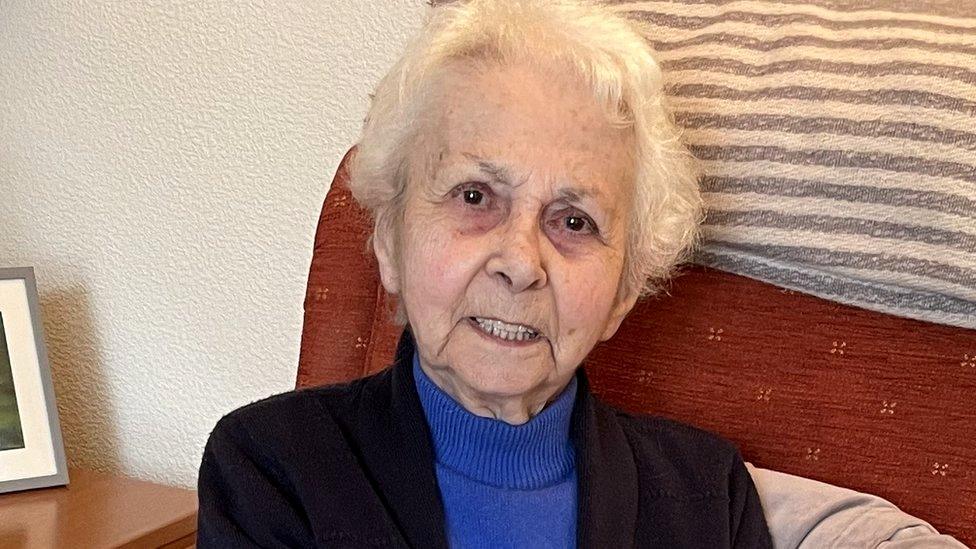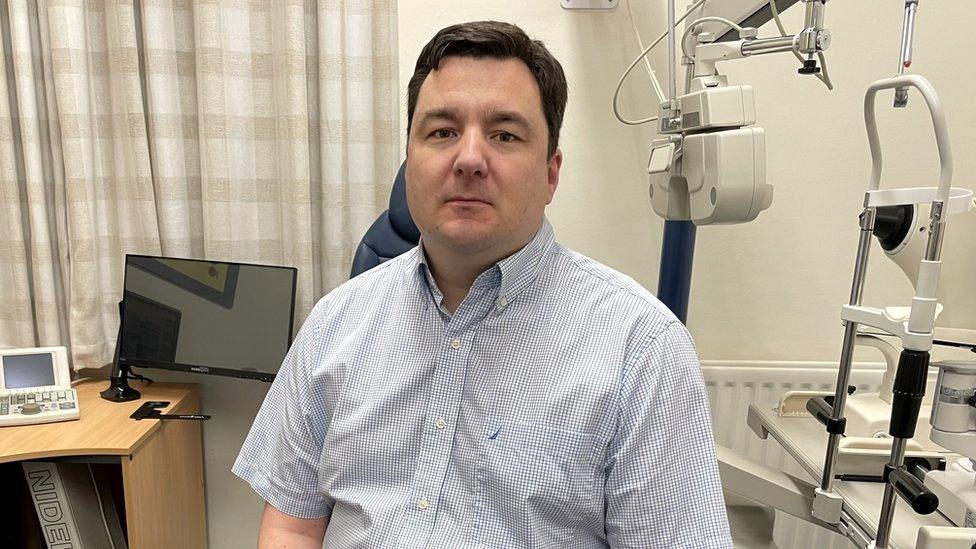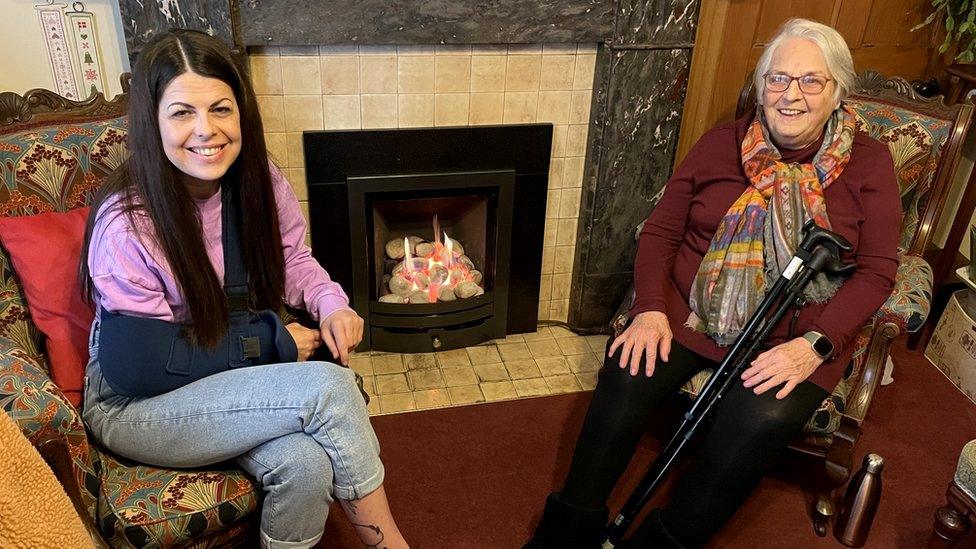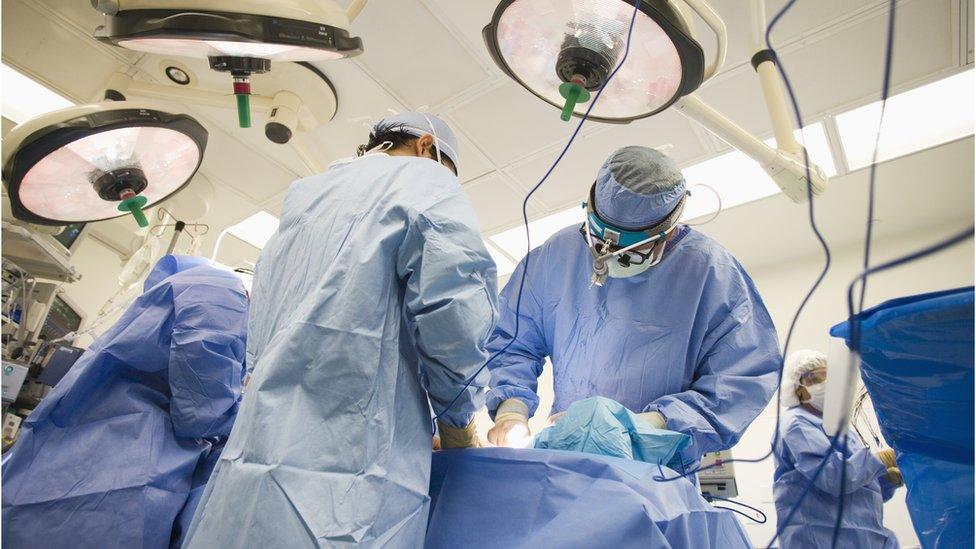Patients going private for cataract and hip operations
- Published

Eileen Watson would have had to wait two years for cataracts surgery
Health professionals have told BBC Scotland they are seeing a rising number of patients turning to private healthcare to avoid spending years on an NHS waiting list - even if they can't afford it.
Eighty-six-year-old Eileen Watson, from Edinburgh, is one of them. When she found out she needed cataracts surgery, she was told she would have to wait two years to get the treatment on the NHS.
Eileen, whose vision had worsened to the point that she could barely read, eventually paid £3,000 to have the surgery done privately.
She said: "At my age, I don't know if I'll be here in two years, not to mention the fact that my eyesight will obviously have deteriorated.
"My family said, what are you waiting for? This is the rainy day you've been saving that money for.
"I can't imagine what it would be like if I hadn't had it."
Kevin Wallace, specialist adviser to the Association of Optometrists, told BBC Scotland his practice in Edinburgh was now referring 55% of patients privately for cataracts surgery. In 2019, it was just 20%.

Kevin Wallace said his practice was now referring 55% of patients privately
Patients seeking other treatments are also drifting to the private sector.
Dr David Shackles, joint chair of the Royal College of General Practitioners in Scotland (RCGP), said GPs were getting more inquiries from patients asking about going private.
He said the most common things patients ask doctors about are orthopaedic problems, such as hip and knee arthritis, as well as cataracts.
"They cause people quite a lot of inconvenience, they cause people a lot of pain, and they want something done about it, but they're not necessarily life-threatening conditions and so they are down the NHS priority list," he said.
"They've already missed out on quite a lot through lockdown and the whole pandemic, and they don't want to be losing more years of either pain or poor mobility or poor eyesight or whatever it is."
According to the RCGP, it is not just people who can afford private healthcare who are paying for treatment. They said they were seeing evidence of people borrowing money from family and friends or using up savings to pay for treatment.
"It's very difficult that patients feel put into that situation," Dr Shackles said.
"Our view is that we'd rather patients weren't in that situation, because it would absolutely exacerbate any health inequalities.
"And patients going for private operations may help their problem, but if we're taking all our surgeons out of the NHS to do private work we're not going to have surgeons working within the NHS," he said.

Edith Level (right) paid for a hip replacement but her niece Jo fought for an NHS operation
For 76-year-old Edith Level, from Dumfries, it was a choice between paying £11,000 for a hip replacement or spending five years on an NHS waiting list unable to walk.
"I was coming apart at the seams, and I was at the stage, personally, that I thought I can't go on another week of this," she said.
"I couldn't walk. I was walking with two sticks, not taking many steps in the day, but I couldn't have gone on."
Her 43-year-old niece, Jo, who is also from Dumfries, suffers from lifelong rheumatoid arthritis, and recently needed a shoulder replacement.
'Additional pain'
Although Jo did get her surgery on the NHS, she said she had to fight "blood, sweat and tears" - and agree to a 23-hour bed after her operation.
"If I could have afforded it, I would have got the surgery in a heartbeat a year ago so that I didn't have to experience the additional pain," she said.
"I just decided to fight my own corner, and I thankfully got an operation because of it."
Jo says that while it doesn't surprise her that people are drifting towards the private sector, it does disappoint her.
"I'm disappointed that we have a system that can't support everybody," she said.
"I feel like if we have an NHS and we all put into the pot and we all contribute, that we should be able to access the National Health Service regardless of financial status."
Related topics
- Published22 February 2022
